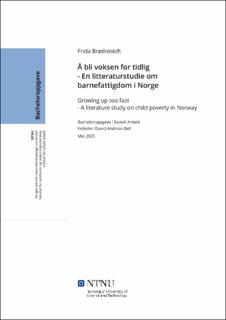| dc.contributor.advisor | David Andreas Bell | |
| dc.contributor.author | Brødreskift, Frida | |
| dc.date.accessioned | 2021-09-28T18:44:31Z | |
| dc.date.available | 2021-09-28T18:44:31Z | |
| dc.date.issued | 2020 | |
| dc.identifier | no.ntnu:inspera:56776074:22928273 | |
| dc.identifier.uri | https://hdl.handle.net/11250/2785644 | |
| dc.description.abstract | Velferdsstaten Norge er et av verdens rikeste land med relativt små sosiale forskjeller. Det forventes derfor ikke at barnefattigdom er et problem. Relativ fattigdom er ikke et utbredt problem i Norge, men for de det gjelder er det en svært omfattende situasjon. Dessuten øker antallet barn som vokser opp i lavinntektsfamilier for hvert år som går, og andelen barn med innvandrerbakgrunn stiger på fattigdomsstatistikken.
Like muligheter for alle er noe som står sterkt i den norske velferdsstaten. Likevel er det sosiale ulikheter blant barn i Norge. Utdanning, fritidsaktiviteter og andre sosiale arenaer er mindre tilgjengelig for barn i lavinntektsfamilier, kanskje spesielt for de barna som også har innvandrerbakgrunn. Barn i lavinntektsfamilier møter store utfordringer knyttet til stigmatisering, fullføring av utdanning og med å opparbeide seg sosial kapital. Disse utfordringene, fører i stor grad til at barna tar på seg ansvar for å håndtere både sin egen og familiens situasjon i ung alder.
Oppgaven belyser hvilke utfordringer som oftest er til stede for barn med innvandrerbakgrunn som vokser opp i lavinntektsfamilier i Norge. Det å leve med dobbelt stigma, nærområdet sin effekt på subjektiv fattigdom og utfordringer knyttet til voksenlivet er blant temaene som diskuteres i oppgaven. | |
| dc.description.abstract | Norway is one of the richest countries in the world with relative low degree of economic inequality. Child poverty is therefore not a problem you would expect to find in one of the worlds most developed countries. Relative poverty is not a widespread problem in Norway, but it is nevertheless a very severe situation for people to find themselves in, no matter the context. The number of children growing up in a low-income family increases every year, and for the last 10-15 years a large part of this number stem from children with immigrant background.
Equal opportunities for all are one of the foundations Norway has built its welfare state. Nevertheless, there are still social inequalities among children in Norway. Education, leisure activities and other social arenas are less accessible for children in low-income families, and perhaps especially for those with an immigrant background. Children in low-income families face major challenges related to stigmatization, the completion of education and the accumulation of social capital. These challenges frequently lead to children taking on responsibility for dealing with both their own and the family's situation at a young age.
This thesis highlights the most frequently occurring challenges that children with immigrant backgrounds who grow up in low-income families in Norway faces. Living with dual stigma, the surrounding areas effect on subjective poverty, and challenges connected to adulthood are among the topics this thesis covers. | |
| dc.language | | |
| dc.publisher | NTNU | |
| dc.title | Å bli voksen for tidlig
- En litteraturstudie om barnefattigdom i Norge | |
| dc.type | Bachelor thesis | |
